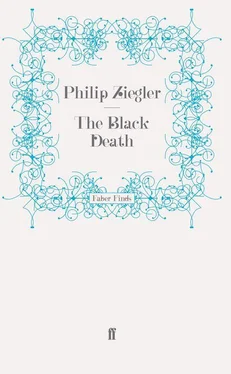…Men thought that, by reason of the fewness of mankind, there should be abundance of all produce of the land; yet, on the contrary, by reason of men’s ingratitude, everything came to unwonted scarcity and remained long thus; nay, in certain countries… there were grievous and unwonted famines. Again, men dreamed of wealth and abundance in garments… yet, in fact, things turned out widely different, for most commodities were more costly, by twice or more, than before the plague. And the price of labour and the work of all trades and crafts rose in disorderly fashion beyond the double. Lawsuits and disputes and quarrels and riots rose elsewhere among citizens in every land…
Contemporary chronicles abound in accusations that the years which followed the Black Death were stamped with decadence and rich in every kind of vice. The crime rate soared; blasphemy and sacrilege was a commonplace; the rules of sexual morality were flouted; the pursuit of money became the be-all and end-all of people’s lives. The fashions in dress seemed to symbolize all that was most depraved about the generation which survived the plague. Who could doubt that humanity was slipping towards perdition when women appeared in public wearing artificial hair and low-necked blouses and with their breasts laced so high ‘that a candlestick could actually be put on them’. When Langland dated so many of the vices of the age ‘sith the pestilens tyme’ he was speaking with the voice of every moralizer of his generation.
No doubt the rodomontades of the virtuous were often overstated and the plague blamed for much for which it was not responsible. Hoeniger for one has suggested that ‘the low state of morals belonged to the period and was no worse after the epidemic than before’. {519} But this cannot be the whole answer, nor was it only the impressionable contemporary chronicler who has recorded the phenomenon. In her study of Orvieto, Dr Carpentier has found ample evidence that the Black Death was followed by an immediate and sharp decline in public morality. There were many more cases of maltreatment of orphans, more people carried arms, the strict rules governing female dress were relaxed and there was a considerable increase in the number of prosecutions and convictions for every kind of crime. {520}
Such self-indulgence strikes one today as a curiously illogical reaction to the disaster which had been so painfully survived. Medieval man in 1350 and 1351 believed without question that the Black Death was God’s punishment for his wickedness. This time he had been spared but he could hardly hope for such indulgence to be renewed if his contumacious failure to mend his ways stung God into a second onslaught. The situation, with sin provoking plague and plague generating yet more sin, seemed to have all the makings of a uniquely vicious circle, a circle from which he could only hope to escape by a drastic mending of his ways. Yet, undeterred, he continued on his wicked course against a background of apocalyptic mutterings prophesying every kind of doom.
In spite of the diatribes of Matteo Villani and the more prosaic statistics of Dr Carpentier it is difficult to take altogether seriously the sins of the post-plague generation. Laxness there certainly was, but it was the laxness which comes through relief from almost intolerable tension and the enjoyment of more money than one has been used to spending. In a stimulating essay, Mr J. W. Thompson has drawn an interesting if sometimes strained analogy between the reactions of the population after the Black Death and after the Great War of 1914–18. {521} In both cases he finds the same complaints about the immorality and instability of those who survived. The gloomy relish with which their conduct was denounced can be matched in the Naples of 1944, the Paris of 1815 or, indeed, in almost any situation where human beings recuperate from some extensive disaster. The decline in morality should not be ignored but nor should it be imagined that the Europeans who survived the Black Death had any very special attributes in the way of wickedness.
Nevertheless, no society could endure the punishment which the plague had meted out and emerge without serious strains. One sign of this, already mentioned, was the damage done to the relationship between priest and laic; another, the tension that arose between different groups within society, in particular between rich and poor. Renouard has examined the result of this in France. {522} In the country, he says, the landowner was generally impoverished while the lot of the peasant, on the whole, improved. An up-and-coming peasantry clashed with an impoverished ruling class which sought to regain its former prosperity at the expense of its tenants. In the cities the situation was very different. Here the laws of inheritance ensured that those who survived among the rich accumulated still greater fortunes while the poor, with nothing to inherit, were economically no better off. A newly rich bourgeoisie joyfully oppressed a defenceless proletariat. In the countryside the gap between rich and poor narrowed, in the cities it widened; in both cases relations deteriorated as a result. The second half of the fourteenth century in France was peculiarly rich in social disorder and the scars left by the Black Death were at least in part responsible for the rural insurrection of Jacques in 1358 and of Tuchins in 1381, and for the risings of the weavers in Ghent in 1379, of the Harelle at Rouen in 1380 and of the Maillotins in Paris in 1382.
The phenomenon recorded by Renouard seems to have been by no means invariable. In Albi, to take one example, little difference was perceptible in the social structure of the city as a result of the plague. Almost everybody was richer than before but, on the whole, the wealth of the dead seems to have been shared out among the living without any further distortion of what was already a formidably inequitable pattern. {523} But even where no extra economic motive arose, the Black Death left a legacy of mistrust between classes. No one could protect themselves against infection but the rich were at least able to take to flight. The bishops, the territorial magnates, the more affluent merchants, took refuge on their country manors and left the city to look after itself as best it could. It was not to be expected that they would meet with much enthusiasm on their return. It was as if Mayfair or the Sixteenth Arrondissement had emptied themselves in time of war and the inhabitants returned when the danger was passed, expecting a welcome from those whom they had deserted.
The impression that the rich escaped the worst of the plague was largely illusory. Many stayed in the cities and, of those who fled, many also found that their rural fastnesses offered no protection. But they did suffer less and their luck was obvious to the less fortunate. An isolated statistical illustration comes from Teruel in Aragon. {524} In 1342, 33.7 per cent of those citizens liable to pay tax did not do so because they had so little money that they were exempted. By 1385 the proportion had dropped to 10.4 per cent. One can accept that, immediately after the Black Death, some redistribution of wealth could have accounted for a drop in the numbers of the poor. But so sharp a fall in their numbers, continuing thirty-five years later, suggests strongly that the poor in the city must almost have been wiped out in the Black Death or subsequent epidemics. The victims did little to express their resentment – there was, indeed, very little that they could do – but a new and potentially dangerous element of class hatred had sprung up.
Professor Russell has suggested that, though the numbers of the peasants may have dropped, at least those who were left were likely to be more healthy. Even if the rule of the survival of the fittest did not apply, the extra food available after the mortality would ensure that they would fare better in future. So far as the Italian peasant, at least, was concerned, Professor Russell’s rosy vision was quickly disallowed. According to Miss Thrupp, this unfortunate species suffered, in the fourteenth century, from acute over-exposure and protein deficiency leading to asthma, quinsy, erysipelas, various digestive and intestinal complaints and bad teeth. {525} Such complaints could only have been cured by a radical change of diet and of living conditions: the only possible benefit they might have gained from the plague was a marginally larger intake of anyhow monotonous and insalubrious food. The medieval peasant, it is clear, had little in the way of material gain to set against the anguish which he had suffered.
Читать дальше












